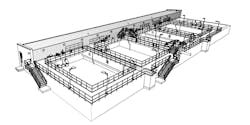New South Sioux City to Treat Industrial Loads With Aerobic Granular Sludge Technology
Aqua-Aerobic Systems, Inc. announced its AquaNereda Aerobic Granular Sludge technology was selected for the new South Sioux City, Nebraska, wastewater treatment facility.
The plant will treat South Sioux City's industrial waste and could be expanded to treat waste from other Sioux City metro communities in the future. All wastewater from South Sioux City and several neighboring communities are currently treated at Sioux City's regional wastewater treatment plant. The new plant will ease the growing burden on Sioux City's plant and leave both facilities with adequate capacity to treat the metro area's wastewater flows.
“The South Sioux City project is tremendously exciting for everyone on the AquaNereda team,” said James Horton, vice president of the process group for Aqua-Aerobic Systems. “It represents another milestone in the widespread acceptance of the AquaNereda technology in North America and adds to the growing installation base currently in Colorado, Alabama, Illinois, Hawaii, Montana, Oklahoma, along with over 200 active projects throughout the USA and Canada. Given that the first Nereda plant began operation in an industrial setting over 15 years ago overseas, this state-of-the-art facility will further underscore the power of the technology to many prospective end-users here in North America.”
Construction of the plant, which will be built next to the Missouri River, is expected to be underway by late summer 2021. The facility is expected to be substantially complete by summer of 2023 and started up by fall 2023. The overall project cost is $39 million. Other key players include John T. Jones Construction in Fargo, North Dakota, and the design engineering from HDR Inc. in Omaha, NE.
After a thorough review of treatment options by the city and HDR, AquaNereda was selected due to its:
- Compact footprint and low cost of construction;
- Low energy consumption;
- Process resilience to variable industrial loadings;
- Low operational cost, including elimination of chemical addition; and
- Flexibility for future capacity expansion.
A variety of industries have significant manufacturing operations in the area, including meat processing, packaged food manufacturing, food and beverage and others. As such, the plant influent is comprised of majority industrial flows. The AquaNereda system is designed to treat 2 million gallons per day (average day) and achieve a high-level of organic and ammonia removal. The overall plant process also includes anaerobic pretreatment, disinfection and aerobic sludge digestion.
